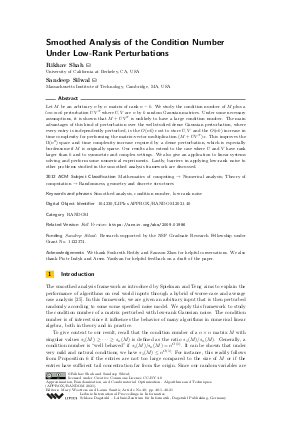@InProceedings{shah_et_al:LIPIcs.APPROX/RANDOM.2021.40,
author = {Shah, Rikhav and Silwal, Sandeep},
title = {{Smoothed Analysis of the Condition Number Under Low-Rank Perturbations}},
booktitle = {Approximation, Randomization, and Combinatorial Optimization. Algorithms and Techniques (APPROX/RANDOM 2021)},
pages = {40:1--40:21},
series = {Leibniz International Proceedings in Informatics (LIPIcs)},
ISBN = {978-3-95977-207-5},
ISSN = {1868-8969},
year = {2021},
volume = {207},
editor = {Wootters, Mary and Sanit\`{a}, Laura},
publisher = {Schloss Dagstuhl -- Leibniz-Zentrum f{\"u}r Informatik},
address = {Dagstuhl, Germany},
URL = {https://drops.dagstuhl.de/entities/document/10.4230/LIPIcs.APPROX/RANDOM.2021.40},
URN = {urn:nbn:de:0030-drops-147332},
doi = {10.4230/LIPIcs.APPROX/RANDOM.2021.40},
annote = {Keywords: Smoothed analysis, condition number, low rank noise}
}

 Creative Commons Attribution 4.0 International license
Creative Commons Attribution 4.0 International license










